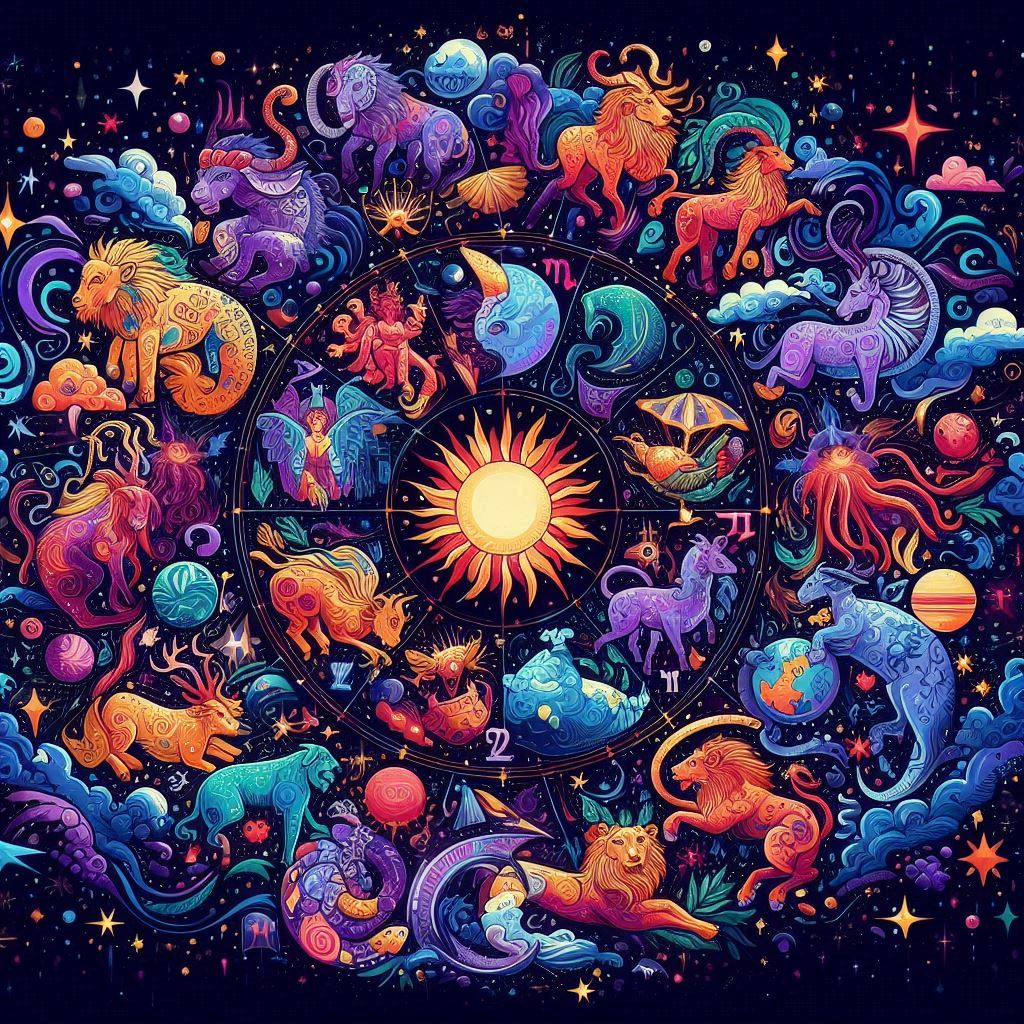“Rasi” is a fundamental concept in Vedic astrology, representing the twelve zodiac signs. Each Rasi corresponds to a specific constellation, and their positions at the time of a person’s birth determine their astrological chart. Understanding Rasis is essential to grasping the intricacies of Vedic astrology, as they form the basis for interpreting planetary influences and predicting events in an individual’s life.
The Twelve Rasis
- Mesha (Aries)
- Symbol: Ram
- Element: Fire
- Ruler: Mars
- Traits: Courageous, energetic, adventurous, and pioneering. Mesha individuals are known for their leadership qualities and enthusiasm.
- Vrishabha (Taurus)
- Symbol: Bull
- Element: Earth
- Ruler: Venus
- Traits: Reliable, practical, patient, and sensual. Vrishabha natives value stability, comfort, and material possessions.
- Mithuna (Gemini)
- Symbol: Twins
- Element: Air
- Ruler: Mercury
- Traits: Curious, communicative, adaptable, and intellectual. Mithuna individuals are sociable and versatile, often excelling in communication.
- Karka (Cancer)
- Symbol: Crab
- Element: Water
- Ruler: Moon
- Traits: Emotional, nurturing, protective, and intuitive. Karka natives are deeply connected to their family and home.
- Simha (Leo)
- Symbol: Lion
- Element: Fire
- Ruler: Sun
- Traits: Confident, ambitious, generous, and charismatic. Simha individuals are natural leaders with a strong sense of self.
- Kanya (Virgo)
- Symbol: Virgin
- Element: Earth
- Ruler: Mercury
- Traits: Analytical, meticulous, practical, and reliable. Kanya natives are detail-oriented and have a strong sense of duty.
- Tula (Libra)
- Symbol: Scales
- Element: Air
- Ruler: Venus
- Traits: Diplomatic, charming, balanced, and sociable. Tula individuals value harmony and have a keen sense of justice.
- Vrishchika (Scorpio)
- Symbol: Scorpion
- Element: Water
- Ruler: Mars
- Traits: Intense, passionate, resourceful, and determined. Vrishchika natives are known for their depth and transformative abilities.
- Dhanu (Sagittarius)
- Symbol: Archer
- Element: Fire
- Ruler: Jupiter
- Traits: Optimistic, adventurous, philosophical, and freedom-loving. Dhanu individuals are seekers of knowledge and truth.
- Makara (Capricorn)
- Symbol: Sea Goat
- Element: Earth
- Ruler: Saturn
- Traits: Disciplined, responsible, ambitious, and practical. Makara natives are hardworking and goal-oriented.
- Kumbha (Aquarius)
- Symbol: Water Bearer
- Element: Air
- Ruler: Saturn
- Traits: Innovative, humanitarian, independent, and unconventional. Kumbha individuals are forward-thinking and value individuality.
- Meena (Pisces)
- Symbol: Fish
- Element: Water
- Ruler: Jupiter
- Traits: Compassionate, imaginative, intuitive, and empathetic. Meena natives are deeply spiritual and often have a strong connection to the mystical.
The Role of Rasis in Vedic Astrology
Rasis play a crucial role in Vedic astrology, influencing various aspects of a person’s life, including their personality, relationships, career, and health. Here are some key areas where Rasis are significant:
- Ascendant (Lagna)
- The ascendant, or Lagna, is the zodiac sign rising on the eastern horizon at the time of a person’s birth. It represents the individual’s outer personality, appearance, and general approach to life. The Lagna sets the stage for the entire birth chart, with each house representing different areas of life.
- Moon Sign (Rasi)
- The Moon sign, or Rasi, is the zodiac sign in which the Moon is placed at the time of birth. It reflects the individual’s emotional nature, subconscious mind, and instincts. The Moon sign plays a significant role in Vedic astrology, often considered more influential than the Sun sign.
- Sun Sign
- The Sun sign represents the individual’s core identity, ego, and life purpose. While the Sun sign is more emphasized in Western astrology, it is still an essential factor in Vedic astrology, providing insights into the person’s vitality and creative expression.
- Planetary Positions and Aspects
- The placement of planets in various Rasis influences their effects on the individual’s life. Each planet has a specific nature and role, and its position in a particular Rasi can enhance or diminish its impact. Additionally, the aspects (drishti) between planets, which are the angular relationships they form, also play a crucial role in determining the overall effects.
- Dasha Periods
- Vedic astrology uses planetary periods, known as Dashas, to predict events and changes in an individual’s life. The ruling planet of each Dasha period exerts its influence based on its placement in a specific Rasi. Understanding the Rasis helps astrologers interpret the effects of the Dasha periods more accurately.
Compatibility and Relationships
Rasis are also essential in determining compatibility and relationships between individuals. Synastry, the comparison of two birth charts, involves analyzing the positions of planets and their aspects in each other’s Rasis. Key factors to consider include:
- Rasi Compatibility
- Some Rasis are naturally more compatible with each other based on their elements (fire, earth, air, water) and qualities (cardinal, fixed, mutable). For example, fire and air signs often have harmonious relationships, while earth and water signs complement each other.
- House Overlays
- In synastry, astrologers examine how the planets from one person’s chart fall into the houses of the other person’s chart. This provides insights into how each individual influences various areas of the other’s life.
- Aspects and Conjunctions
- The aspects and conjunctions between planets in both charts indicate the nature of the relationship. Harmonious aspects, such as trines and sextiles, suggest compatibility and ease, while challenging aspects, like squares and oppositions, indicate potential conflicts and areas for growth.
Conclusion
In summary, Rasis are the foundation of Vedic astrology, shaping the interpretation of planetary influences and providing insights into an individual’s personality, relationships, career, and health. By understanding the twelve Rasis and their unique characteristics, astrologers can offer valuable guidance and predictions, helping individuals navigate their lives with greater awareness and purpose.
